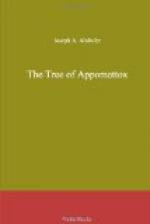“And we’re to be led by Sheridan. I think he saved us at Perryville in Kentucky, but they say he’s become a great cavalry commander. Do you know him, Mr. Shepard?”
“Well. A young man, and a little man. Why, you’d overtop him more than half a head, Mr. Mason, but he has a great soul for battle. He’s the kind that will strike and strike, and keep on striking, and that’s the kind we need now.”
“Here are our own men just ahead. I see the three colonels riding together.”
They went forward swiftly and told what they had seen, Shepard also describing the nature of the ground ahead, and the manner in which the two roads converged.
“Which column do you think will reach the junction first?” asked Colonel Hertford.
“They’ll come to it about the same time,” replied Shepard.
“And so a clash is unavoidable. It was not our purpose to fight before we reached General Sheridan, but since the enemy wants it, it must be that way.”
Orders were issued for the column to advance as quietly as possible, while skirmishers were thrown out to prevent any ambush. Shepard rode again into the forest but Dick remained with Warner and Pennington. Warner as usual was as cool as ice, and spoke in the precise, scholarly way that he liked.
“We march parallel with the enemy,” he said, “and yet we’re bound to meet him and fight. It’s a beautiful mathematical demonstration. The roads are not parallel in an exact sense but converge to a point. Hence, it is not our wish, but the convergence of these roads that brings us together in conflict. So we see that the greatest issues of our life are determined by mathematics. It’s a splendid and romantic study. I wish you fellows would pay more attention to it.”
“Mathematics beautiful and romantic!” exclaimed Pennington. “Why, George, you’re out of your head! There’s nothing in the world I hate more than the sight of an algebra!”
“The trouble is with you and not with the algebra. You were alluding in a depreciatory manner to my head but it’s your own head that fails. When I said algebra was a beautiful and romantic study I used the adjectives purposely. Out of thousands of adjectives in the dictionary I selected those two to fit the case. What could be more delightful than an abstruse problem in algebra? You never know along what charming paths of the mind it will lead you. Moreover there is over it a veil of mystery. You can’t surmise what delightful secrets it will reveal later on. What will the end be? What a powerful appeal such a question will always make to a highly intelligent and imaginative mind like mine! No poetry! No beauty! Why every algebraic problem from the very nature of its being is surcharged with it! It’s like the mystery of life itself, only in this case we solve the mystery! And if I may change the metaphor, an algebraic formula is like a magnificent diamond, cutting its way through the thick and opaque glass, which represents the unknown! I long for the end of the war for many reasons, but chief among them is the fact that I may return to the romantic and illimitable fields of the mathematical problem!”




